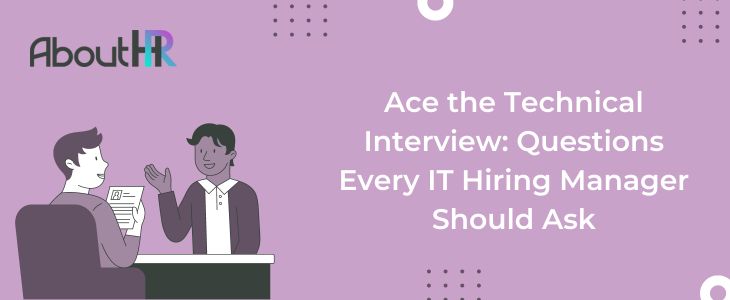So you’ve got a stack of resumes on your desk for that open developer position. The candidates look good on paper, but you know that’s only part of the story. Now comes the hard part—the technical interview. As an IT hiring manager, it’s up to you to dig deeper to find the best candidate for the job. The technical interview is your chance to assess both their hard and soft skills to determine if they’re the right fit for your team’s needs. So what questions should every IT hiring manager ask?
Identify the Must-Have Technical Skills
As an IT hiring manager, your top priority is identifying candidates with the technical chops to get the job done. But with so many skills and specializations out there, how do you know what’s really important for a role? Focus on the must-have technical skills.
For software engineering roles, proficiency in languages like Java, C++, or Python and frameworks like .NET or Ruby on Rails are usually essential. Don’t just ask about experience with a language, probe into specific projects where they applied it. See if they keep their skills sharp through side projects or open source contributions.
For web development, know-how in HTML, CSS, and JavaScript is key. Ask about experience with frontend frameworks like React or Vue.js and version control systems like Git. See if their portfolio includes responsive, mobile-friendly sites.
For data science, stats and math chops, and expertise in languages like SQL, Python, and R are important. Quiz them on machine learning algorithms and data visualization techniques. Ask how they stay on top of trends in big data, AI, and analytics.
For IT support, knowledge of operating systems, hardware, networking, and security fundamentals are must-haves. Certifications in areas like networking, cybersecurity, or cloud platforms are a plus. See if they have experience troubleshooting issues remotely and delivering great customer service.
In the end, the specific technical skills you need will depend on the role and your company’s tech stack. But by identifying the must-haves, crafting pointed questions to assess proficiency, and evaluating side projects and portfolios, you’ll find candidates with the skills to hit the ground running. And that’s a win for your whole IT team.
Ask Open-Ended Questions to Assess Problem-Solving Skills
To really get a sense of a candidate’s problem-solving skills, ask open-ended questions that encourage them to think on their feet. Start with a scenario like:
- “Imagine you discover the website is down. Walk me through the steps you would take to diagnose and fix the issue.”
This allows them to demonstrate how they approach troubleshooting logically and methodically. Listen for questions they ask to clarify the situation and narrow down the problem. The ideal candidate will have a systematic process for resolving technical issues.
You might also present a hypothetical new project and ask:
- “How would you go about designing a solution for this from scratch?”
Look for creativity and the ability to think strategically. Do they consider scalability, security, and user experience right from the start? Or do they dive into coding prematurely?
Ask about a time they struggled with a complex technical challenge. For example:
- “Describe a technical problem you faced that you found particularly difficult to solve. What was your process for working through it?”
See if they can articulate what they tried, how they overcame obstacles, and what they learned. Problem-solving is a journey, not a destination. The best candidates will show perseverance and a growth mindset.
In the end, you want someone who asks good questions, thinks before they act, learns from their mistakes, and can navigate ambiguity. Open-ended, scenario-based questions are the best way to assess these qualities in a technical interview. With the right line of questioning, you’ll find an innovative problem-solver who can drive your team and company forward.
Ask About Staying Up-to-Date With Technology Advancements
As an IT hiring manager, it’s critical to assess how well a candidate stays up-to-date with the latest advancements in technology. The tech field moves at lightning speed, and you need someone who can keep up. Ask questions that reveal how much time and effort they put into continuous learning.
What new technologies are you most excited about? Why?
A good candidate will be enthusiastic about up-and-coming technologies that could impact their work, such as AI, automation, blockchain, and cloud platforms. They should be able to speak knowledgeably about the technologies and their potential benefits.
If you could get training or certification in any new technology right now, what would it be? Why?
The answer provides insight into where the candidate wants to strengthen their skills. It’s a good sign if they want to learn technologies that align with your company’s priorities and future tech stack. Offer to provide opportunities for them to pursue relevant training and certifications.
By asking the right questions about staying up-to-date with technology, you can gain valuable insight into a candidate’s thirst for knowledge and passion for their work. The tech industry rewards lifelong learners, so look for someone who will thrive in an environment of constant change and innovation.
Mastering the Art of Technical Interviews
So there you have it, some of the most important questions you should be asking as an IT hiring manager in a technical interview. Asking the right questions is key to determining if a candidate has the necessary technical skills and problem-solving abilities to excel in the role. Don’t be afraid to dive deep into technical discussions and see how candidates think on their feet. While technical skills are important, also look for candidates that show passion for the work, a willingness to learn, and the ability to communicate complex ideas. If you ask thoughtful questions, listen carefully to the responses, and trust your instincts, you’ll hire IT professionals that will make a strong, long-term impact. The key is simply knowing the right questions to ask.


